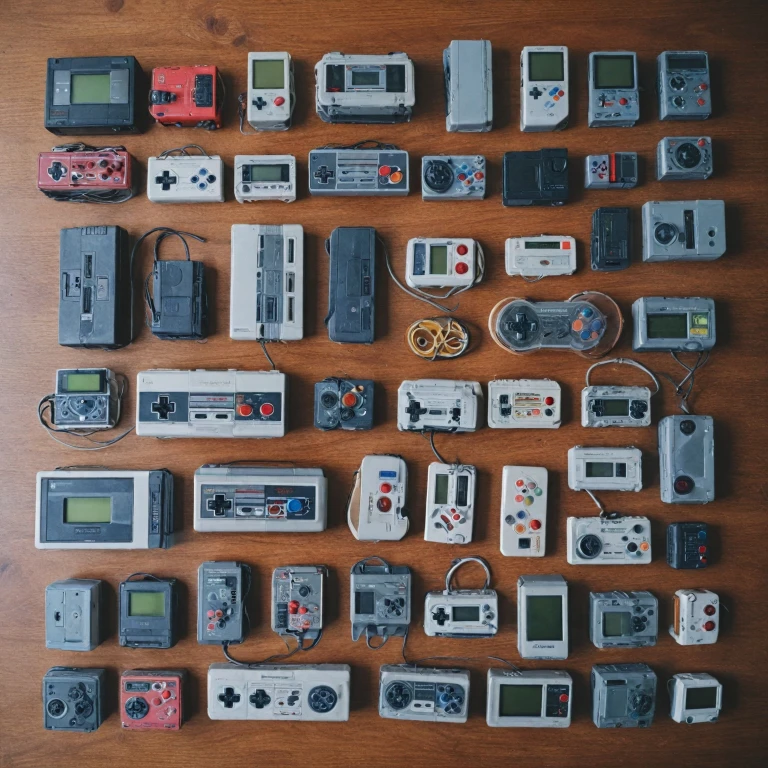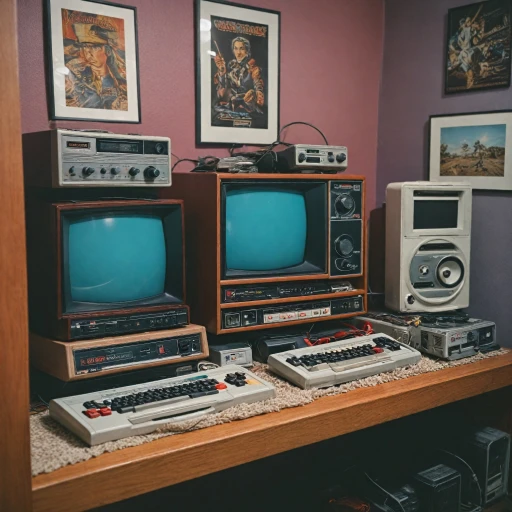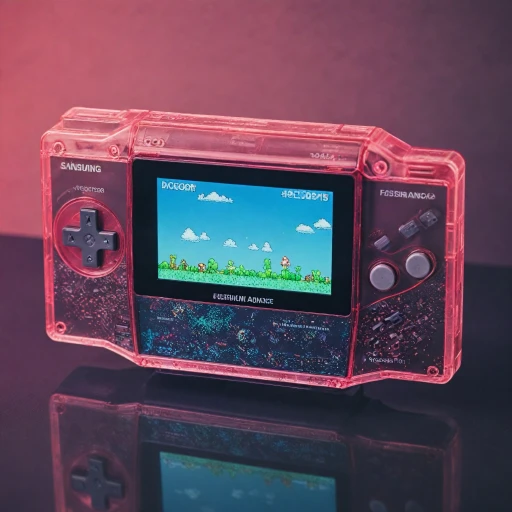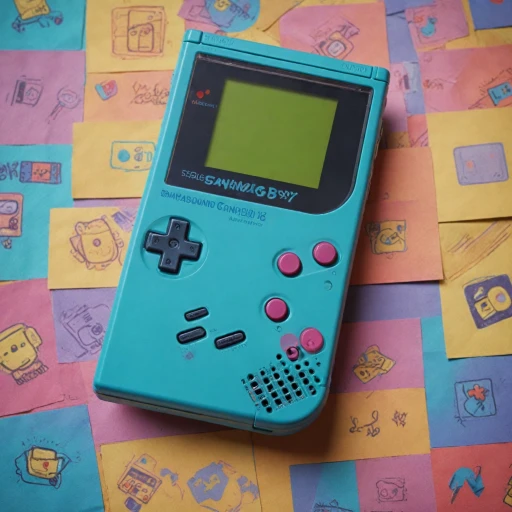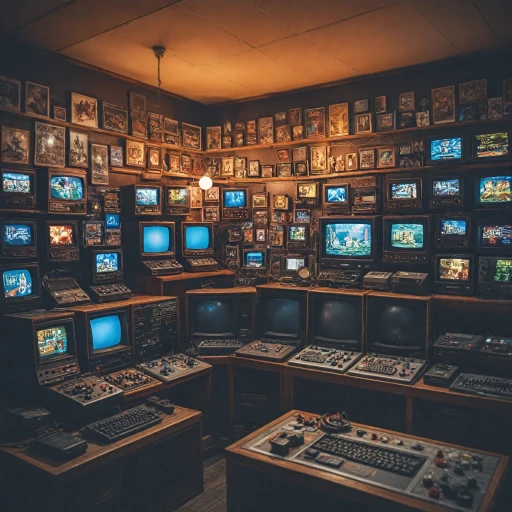The Allure of Retro Game Consoles
The Nostalgia of Vintage Gaming Systems
The charm of retro game consoles lies in their ability to transport players back to a simpler time, evoking a sense of nostalgia that modern systems often can't replicate. These classic consoles, with their pixelated graphics and iconic soundtracks, capture the imagination of millions who remember them fondly or wish to experience a piece of gaming history.
Retro gaming offers a tangible link to the past, allowing players to revisit the early days of video gaming when innovation was at its peak, and each new system or game felt groundbreaking. Games like those on the Atari, Game Boy, and Nintendo have become cultural touchstones. They provide not only endless entertainment but also a historical context for how video games have evolved over the decades.
Beyond nostalgia, these consoles provide a unique tactile experience. Many retro systems, such as the Super Nintendo and the Playstation Classic, are characterized by their unique controllers and simple plug and play setup, which enhance that distinct feeling of holding a piece of gaming history. With systems like the Atari Flashback or any super console mini, you can relive your favorite classic games without the need for the original cartridges.
Additionally, the retro gaming scene has witnessed a resurgence, thanks in part to the affordability and accessibility of these systems. Retro handheld game consoles, such as the Nintendo-based systems, and the jun-built game sticks, provide an opportunity for portable gaming on a budget. The presence of dual wireless controllers and HDMI outputs further integrates these beloved systems into modern home entertainment setups, bridging the gap between past and present.
As the landscape of gaming evolves, players continue to find immense joy in these vintage systems. They serve as a reminder of gaming's roots and continue to influence the industry today, as evidenced by the ongoing popularity of retro-themed consoles and collections. For further insight into the enduring legacy of these classic systems, delve into the comprehensive analysis available on
Exploring the Legacy of the Gameboy. The depth of these experiences not only cements their place in history but also ensures their continued relevance in today's gaming culture.
A Brief History of Retro Game Consoles
A Glimpse into Gaming's Yesteryear
The world of gaming has witnessed a fascinating evolution, with retro game consoles holding a special place in history. The origins of these systems date back to the late 1970s and early 1980s, a time when video games were just beginning to capture the imagination of players worldwide. It was an era defined by the charm of simplicity, with consoles designed for straightforward plug and play experiences.
The trailblazers of this era included the legendary Atari systems, which paved the way for home gaming with engaging arcade-style games. The introduction of classic consoles like the Nintendo Entertainment System (NES) and the SEGA Genesis brought us unforgettable classic games that many still cherish today. These systems were groundbreaking not only for their games but also for introducing innovations like handheld devices and the first wireless controllers.
Retro gaming systems offered something magical with their straightforward mechanics and iconic graphics. The rise of portable gaming, embodied by devices like the Game Boy, allowed players to explore a pocket-sized world of adventure, making gaming more accessible and versatile. Meanwhile, the introduction of systems like the PlayStation Classic brought advanced technology, further enhancing the playing experience with dual wireless capabilities and better graphics.
Today, while many modern gamers might gravitate towards cutting-edge consoles, the charm of retro gaming continues to captivate enthusiasts. Retro systems are celebrated for their nostalgia, unique design, and unexpectedly engaging gameplay. For those looking to delve deeper into the legacy of classic consoles, exploring systems like the TurboGrafx-16 can offer rich insights into the evolution of video games.
Iconic Retro Consoles and Their Games
Legendary Consoles and Their Timeless Games
Throughout the history of gaming, certain retro consoles have carved their niche as iconic systems, each with its signature roster of games. These classic consoles brought video gaming to the forefront of pop culture, creating a foundation on which modern gaming stands today.
One of the most celebrated retro consoles is the Nintendo Entertainment System (NES). This legendary system introduced gamers to classics like "Super Mario Bros." and "The Legend of Zelda," offering an immersive gaming experience that continues to captivate players even now. The NES was a testament to the charm of retro gaming with its relatively simple yet compelling graphics and sound.
The Sega Genesis is another powerhouse in the realm of retro gaming. Known for its faster processor and more complex games compared to predecessors, it offered titles like "Sonic the Hedgehog" and "Streets of Rage," which delivered new levels of action and thrill.
Additionally, systems like the Game Boy brought a handheld revolution with classic games such as "Tetris" and "Pokémon Red/Blue." Its portable nature transformed gaming into an experience that could be enjoyed anywhere, anytime, providing the roots for today's sophisticated handheld game systems.
For those who enjoy plug-and-play simplicity, the Atari Flashback consoles deliver a nostalgic trip with classics like "Pong" and "Asteroids." These systems maintain the simplicity and charm of the original Atari gaming experiences, complete with wireless controllers, ensuring a seamless transition between nostalgic memories and modern conveniences.
Today, the charm of these consoles is relived through mini versions and more affordable gaming options with HDMI output, providing enthusiasts the chance to experience retro gaming in high-definition. Dual wireless controllers enhance these experiences further, making them accessible to new generations of gamers.
Moreover, as mentioned previously, the rise of retro handheld systems ensures that portable gaming continues to thrive. For extensive details on handheld emulators, check out this
in-depth exploration of handheld emulators. Embrace these classics, evaluate their evolution, and savor the unchanging allure they bring to the world of gaming.
Comparing Retro and Modern Gaming Experiences
Embracing the Classic and Modern Worlds
The convergence of retro and modern gaming experiences highlights a fascinating journey for both casual and dedicated gamers. The pixelated charm of retro consoles, with their iconic games, brings a nostalgic thrill that's hard to replicate. Although technology has raced ahead to create high-definition graphics and immersive gameplay, there's a unique satisfaction found in playing classic games.
Modern gaming consoles focus on exhilarating graphics, dynamic storylines, and online capabilities. However, retro consoles like the Atari Flashback or the PlayStation Classic take us back to simpler times. These are perfect for those looking to relive their childhood or discover what gaming was before the era of 3D worlds and virtual reality.
When examining the physical aspects, retro consoles are often bulkier compared to the sleek, mini designs of modern systems like a pocket-sized handheld game. The wireless controllers of today replace the wired ones of the past, providing more freedom to explore the fictional worlds within our favorite games. Yet, there's a tactile pleasure in pressing the buttons of a classic gaming console that many enthusiasts miss.
Considering the accessibility of games, retro gaming offers a unique advantage. Many systems come with built-in classic games, offering plug and play simplicity. This can often be more cost-effective in terms of price as opposed to purchasing expensive new games. Furthermore, retro game systems frequently have HDMI output capability, making it easier than ever to integrate them into modern home entertainment systems.
Ultimately, whether through the nostalgia of the past or the excitement of the present, gaming consoles continue to evolve. The allure of retro handhelds or game sticks lies in playing the iconic classics. Meanwhile, avid gamers revel in the capabilities of the best gaming console of today. The choice between retro game experiences and modern innovations boils down to personal preference and the unique joys they each bring to the gaming world.
Collecting and Preserving Retro Consoles
Preserving the Classic Game Experience
Collecting retro consoles is more than just a niche hobby; it is about safeguarding history. For enthusiasts, owning a piece of gaming history offers a nostalgic journey that newer systems cannot replicate. The tactile experience of a Game Boy or the simple joy of playing on an Atari console is irreplaceable. It lets players dive back into an era when gaming meant blowing into cartridges and tinkering with coaxial cables.
Today's market has seen a resurgence in these beloved relics. Devices like the Atari Flashback or the Super Console mini are popular with those who crave the feel of classic games with a modern twist. Some are even equipped with HDMI output and dual wireless controllers, merging the past with present-day tech. The best part? Most of these systems include free shipping, making them easily accessible to fans eager to relive the gaming memories of their youth.
For those who want more than mere nostalgia, collecting retro handhelds like the Game Boy or the plug-and-play systems can be a thrilling pursuit. These consoles often command a higher price but stand as cornerstones of gaming history. As demand grows, so too does the emphasis on preservation, with enthusiasts taking great strides to maintain the integrity of these vintage devices.
Restoration plays a vital role in collection and preservation. Owners often go to great lengths to ensure their classic systems are functional and maintain their aesthetic appeal. Whether it’s replacing old capacitors in a system or sourcing original parts, the dedication of collectors keeps retro gaming vibrant and alive.
Investing in retro consoles is not just about owning a gaming console but an emotional connection to the formative years of video gaming. With online communities thriving, those interested in diving deeper into this world can explore rich discussions on classic systems and discover where to find the best deals. In an age dominated by powerful gaming consoles, the charm of retro remains timeless, constantly reminding us of gaming's roots and evolution.
The Future of Retro Gaming
Anticipating the Retro Renaissance
The future of retro gaming holds a fascinating allure for enthusiasts and collectors alike. As technology advances, the desire for the nostalgic experiences offered by retro game consoles continues to grow. This trend is evident in the rising popularity of classic games being re-released on modern systems, offering gamers a taste of the past with the convenience of today's technology.
Retro gaming now reaches beyond the hobbyist's realm, attracting a broader audience with its unique charm. Modern manufacturers have recognized this resurgence, creating mini versions and plug-and-play systems that appeal to both vintage game lovers and newcomers. Products like the Atari Flashback and other similar consoles provide an opportunity to relive the classic games in a mini, portable format with features such as HDMI output and wireless controllers.
As we embrace the contemporary landscape, collecting and preserving retro consoles remains crucial. Many gamers and collectors are actively seeking out classic systems such as the original Nintendo and the Game Boy, valuing them not only for play but for their historical and cultural significance. There's an increasing appreciation for how these classic machines paved the way for today's gaming consoles.
Furthermore, the gaming community anticipates improvements in emulation technology. Retro handheld devices, like the ones offering dual wireless performance, allow gamers to enjoy a wide array of vintage games on a single system, often with free shipping options making them widely accessible. The future may even bring about new ways to experience these beloved games, perhaps integrating virtual reality or augmented reality for an innovative twist on classic gaming.
In summary, the future of retro gaming is promising, combining the best of past and present gaming experiences. As the demand for retro games continues to grow, both collectors and new players can look forward to a rich and engaging journey through gaming history.


